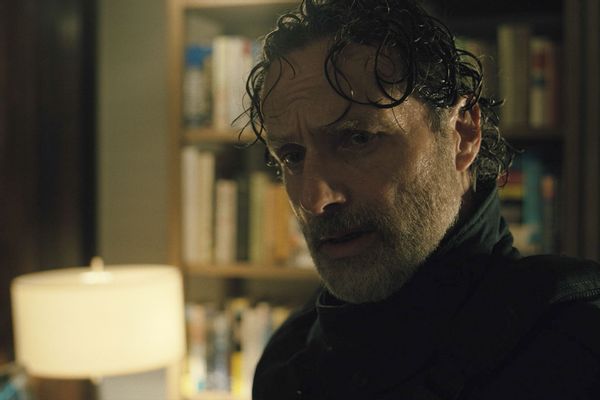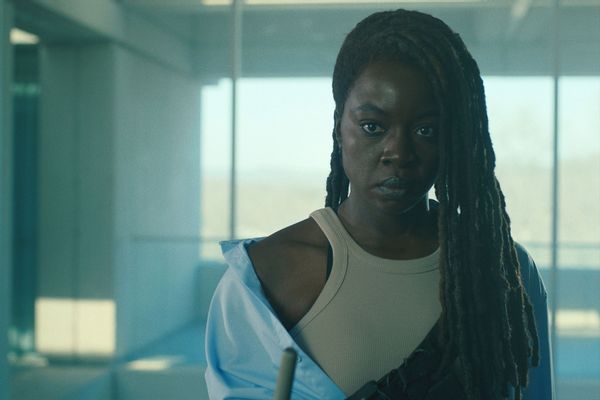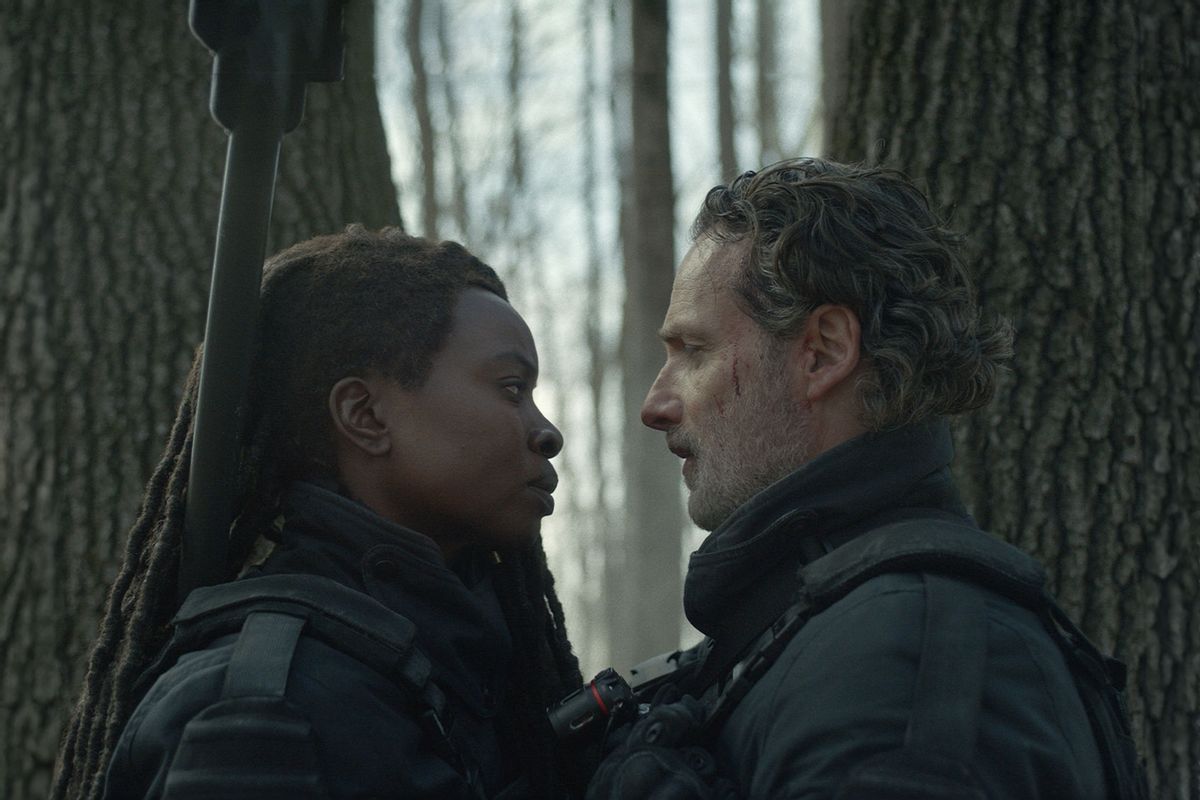End-of-the-world stories, the good ones anyway, invite us to appreciate all the modern conveniences we take for granted, along with their excess. Before this week’s episode, “The Walking Dead: The Ones Who Live” spent time inside an empty mall with Michonne (Danai Gurira) and fellow road warrior Nat (Matthew August Jeffers). The two convalesced there for a year to recover from an unprovoked mustard gas attack by the Civic Republic Military.
The place was vast and had everything they needed, but it was husk. Not home, and nothing like zombieland's Philadelphia, the walled urban paradise the CRM purports to protect.
This city has all the comforts of the old one but no real liberty. Rick Grimes (Andrew Lincoln) was “saved” by a frenemy he lived beside and conscripted into the CRM workforce, then its fighting forces. Through happenstance he and his wife Michonne, who has been searching for him for almost eight years, meet on the battlefield, and on opposing sides.
They don’t get on the same page until “What We,” the fourth and latest episode of the six-part limited series. Even then, the Grimeses don’t get to where they need to be until nearly two-thirds into this chapter – and yes, this refers to the interlude Richonne fans ached for and were denied for five and a half years: the makeup sex.
“What We" doesn’t hang off that catharsis or even guarantee it, which is to its credit. Gurira wrote it as a classic theatrical two-hander, confident territory for her. Almost 20 years ago she won an Obie for her first two-woman play “In the Continuum,” which she co-wrote and co-starred in with Nikkole Salter.
This is an alternate universe away from that work, asking only for Gurira and Lincoln to be Michonne and Rick — two people, one of them bent on driving the other away. This is an ancient trope that could have resolved poorly.
What We,” is a ballet featuring surefooted partners who never slip.
But when the third episode ended with Michonne leaping on Rick in the middle of a helicopter ride and throwing both of them out its open door, "The Ones Who Live" tossed all creative doubts out with them. The Grimeses always survive to fight – this time, with each other.
Gurira correctly wagers the audience doesn’t need to know how Rick and Michonne survived the fall, choosing to make their union’s possible demise the real crisis. Besides, a lake is visible from the window of the empty luxury condo where they’ve holed up – a smart home with working electricity, running water and AI-regulated thermostats. If the world weren't swarming with undead, this could be a Airbnb romantic getaway destination.
“We need a time out,” Michonne tells him tersely, and that what this space provides, with its modern, elegant furnishings and obligatory Roomba buzzing around. It’s a pause in the chaos. A haven for them to take a beat.
How do you fulfill romantic hunger, yearning and waiting without the plot devolving into corn mush? You kill the hero, The Brave Man, and watch the samurai he married resurrect him.
Episode 3 sets the starting line for “What We” when Rick feints at divorcing Michonne by saying, “Everything we had is broken.” All that comes after is persuasion.
 Andrew Lincoln in "The Walking Dead: The Ones Who Live" (AMC)Lincoln’s Rick in this story is a lost wolf forced to domesticate to keep the hunters off his pack's scent. Their argument starts there: Michonne remains untamed and knows Rick isn't either. Still, Rick refuses to escape his jailers because he’s convinced that staying behind will prevent the CRM from tracking down Michonne and his children. (This is also the episode where Michonne finally reveals their son RJ’s existence to him.)
Andrew Lincoln in "The Walking Dead: The Ones Who Live" (AMC)Lincoln’s Rick in this story is a lost wolf forced to domesticate to keep the hunters off his pack's scent. Their argument starts there: Michonne remains untamed and knows Rick isn't either. Still, Rick refuses to escape his jailers because he’s convinced that staying behind will prevent the CRM from tracking down Michonne and his children. (This is also the episode where Michonne finally reveals their son RJ’s existence to him.)
Then he swaps his tune for a flimsy refrain about needing to change the CRM, a massive military institution, from the inside.
“So. You’re trying to, uh, keep us safe. By maybe changing the CRM one day. Who might come after our home and put us in danger? That’s it? You won’t come home with me? To your life? Your kids?”
We need your help to stay independent
All perceived safety in this world is an illusion. Naturally there’s an undead rot at the heart of the complex and a ticking clock. Their helicopter crashed into an adjacent tower in the same building, making them home-free, since that means the CRM thinks they’re dead too. But the threat posed by Rick’s bosses isn’t halting him. The main obstacle is in his head.
Gurira writes Richonne's reunion as a ride from bitterness to sweet, teasing out Michonne’s pull and Rick’s push through sadness, anger, aggravation and, at some point, furious acceptance. There are moments when it looks as if they’re truly finished. Wandering zombie packs give them a place to healthily redirect their frustrations. Since marriage counseling is not a priority in an apocalypse, this has to suffice.
Even in mediocre seasons, "The Walking Dead" thrived on its performances, with Lincoln and Gurira's portrays anchoring it. As one would expect, then, “What We,” is a ballet featuring surefooted partners who never slip.
All of it, from their arguments to the comical nagging as they realize how out of sync they are during a team zombie smackdown, feels natural and smoothly coordinated with their surroundings. She’s about to walk away, and he finds her precisely when an explosion releases passels of hungry undead into their midst.
All perceived safety in this world is an illusion.
In another temporary safe room, the two discover their retreat, called Greenwood, was a post-apocalyptic tech incubator composed of “like-minded innovators in various fields seeking to live off the grid to create a new, more sustained and hopeful tomorrow.”
“Our motto, progress and redemption through innovation, is now like a sick joke to me,” its founder Lakshmi Patel wrote in her suicide note, flogging herself for her failure and hubris. The living spaces show they thought of every luxury but not the basic contingencies like providing enough food for everyone to survive. The walkers, Rick and Michonne notice, are gaunt.
“When folks try to save the world their own way, it tends to go to s**t,” Michonne observes. “Sound familiar?”
Want a daily wrap-up of all the news and commentary Salon has to offer? Subscribe to our morning newsletter, Crash Course.
Careful writing and disciplined passion of the performances make "What We" one of those episodes that affirms the new economic direction this franchise has taken. And its producers need to tap Gurira to write more often. Her romantic dialogue is also pragmatic and purposeful, such as when a still-angry Michonne tersely thanks Rick for remaining with her in a situation that looks unsurvivable.
 Danai Gurira in "The Walking Dead: The Ones Who Live" (AMC)“You never have to thank me ever,” he says calmly. By then, the building is buckling around them. But their animosity is caving in too. They find time to make love anyway and resolve to go on, moments before the ceiling starts to collapse on them.
Danai Gurira in "The Walking Dead: The Ones Who Live" (AMC)“You never have to thank me ever,” he says calmly. By then, the building is buckling around them. But their animosity is caving in too. They find time to make love anyway and resolve to go on, moments before the ceiling starts to collapse on them.
“You’re the love of my life. I couldn’t just let you go,” Rick tells Michonne, admitting that when it looked as if she was going to leave, “It felt like my heart ripped itself out of my chest and walked out the door.”
Getting these long-separated lovers back together is the entire goal of “The Ones Who Live,” and Gurira’s script earns that by carefully concocting a slow-heating chemical reaction that never fully combusts, even during the sex, but stabilizes, yielding a more lasting satisfaction in the long run.
The Grimeses can’t stay in this illusionary luxury; paradise crumbles to rubble moments after they dash out and fine a gassed-up car, giggling and determined to resume the way they were. By that point, Rick has abandoned his dead nightmares of brokenness. “We can make this whole damn world ours if we want to," he tells his wife. Won't that be killer.



Shares